Kowloon offers halal‑certified options for every craving Muslim travellers!
Beyond Adobo: 13 Must-Try Halal Filipino Dishes For Muslim Travellers
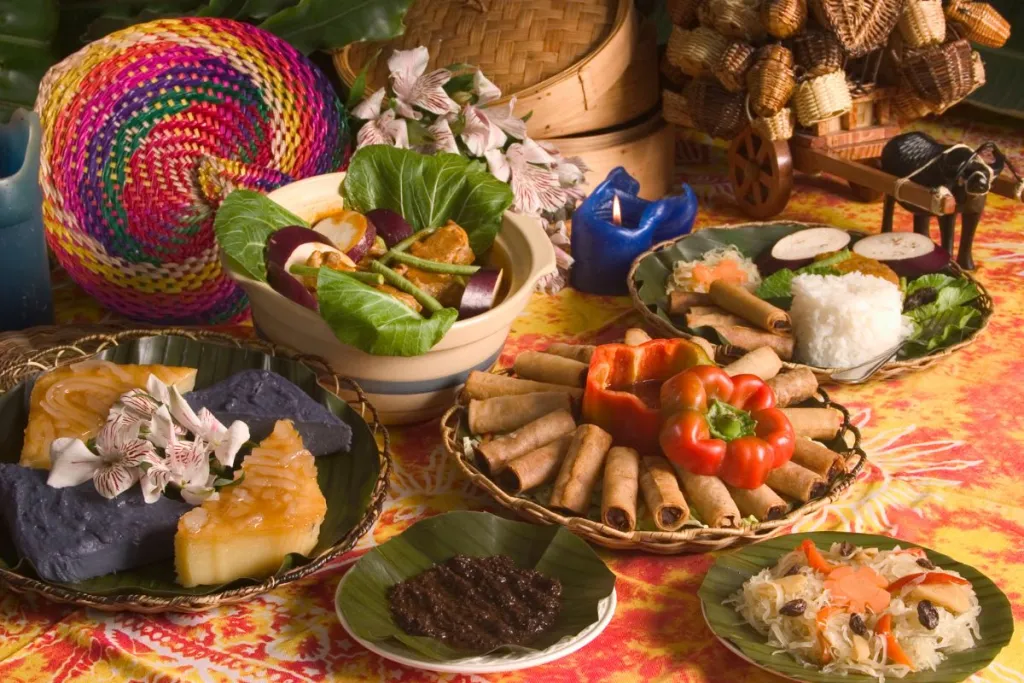
Filipino cuisine is a vibrant fusion of flavours—sweet, savoury, tangy, and occasionally spicy. For Muslim travellers, finding halal-certified or Muslim-friendly versions of local dishes can be a challenge. Fear not! The Philippines boasts a growing halal food scene, particularly in cities like Manila, Davao, Zamboanga, and Cebu.
Building on this rich culinary landscape, Halal Filipino cuisine is deeply rooted in the country’s southern regions, where centuries-old Islamic traditions have shaped distinctive dishes found nowhere else. From the aromatic kitchens of Zamboanga to the family-run eateries of Cotabato, Muslim culinary heritage thrives alongside mainstream Filipino fare. So pack your appetite—and your camera—for a delicious adventure that celebrates both culture and flavour!
Here are 13 must-try halal Filipino dishes that will make your trip both delicious and culturally enriching, without compromising your dietary needs.
Embark on a flavourful journey through the Philippines—one Halal bite at a time!
Filipino cuisine is a feast of bold flavours, rich traditions, and regional specialities waiting to be discovered. From the smoky aroma of halal chicken inasal to the comforting warmth of pianggang and the spice of Tausug satti, taste your way across islands, explore hidden halal gems, and experience the Philippines through its scrumptious food!
Also read: 10 Muslim-Friendly Airbnb in Manila, Philippines
1. Chicken Inasal (Grilled lemongrass chicken)
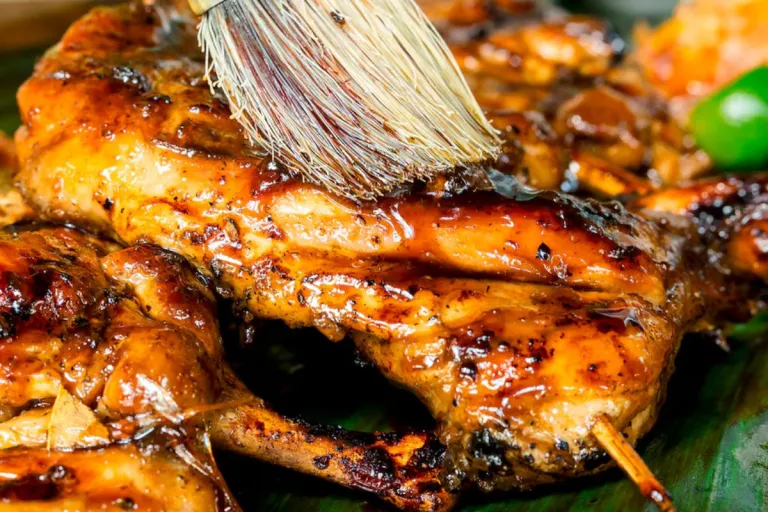 Image credit: Knorr | Official Website
Image credit: Knorr | Official Website
This juicy, smoky grilled chicken dish originates from the Visayas region, especially Bacolod and Iloilo. Chicken inasal is marinated in a mix of calamansi (local lime), coconut vinegar, garlic, and annatto oil before being grilled to perfection. Its bold, tangy flavour and distinct yellow-orange hue make it a favourite across the Philippines.
Muslim travellers can find halal versions in Bacolod, Iloilo, and Manila. In Manila, Bacolod Chicken House Express at SM Mall of Asia offers halal-friendly options upon request, while JT’s Manukan Grille (various branches) serves Bacolod-style inasal. Look for signs that say “No Pork, No Lard” or ask “Halal po ito?” and also "Halal certified" signs when ordering.
2. Beef Rendang (Filipino-style, Halal version)
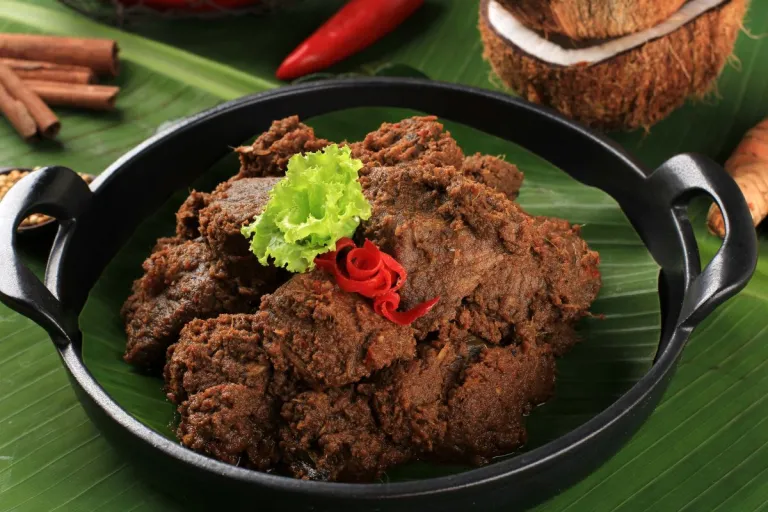 Image credit: Ika Rahma | Canva Pro
Image credit: Ika Rahma | Canva Pro
While rendang is originally from Indonesia and Malaysia, Mindanao’s Muslim communities have developed their own variation of this rich, slow-cooked beef dish. The Maranao version includes palapa—a local spice paste made from sakurab (native shallot), ginger, and chilli—which adds depth and heat to the already flavorful dish.
Halal Filipino-style rendang can be enjoyed at Dennis Coffee Garden in Zamboanga City or Tambilawan Kamayan Restaurant in General Santos City. These eateries specialise in Mindanaoan halal cuisine and are known for their authentic preparations, ensuring Muslim travellers get to enjoy this local twist on a Southeast Asian classic.
3. Halal Chicken Adobo (The national dish)
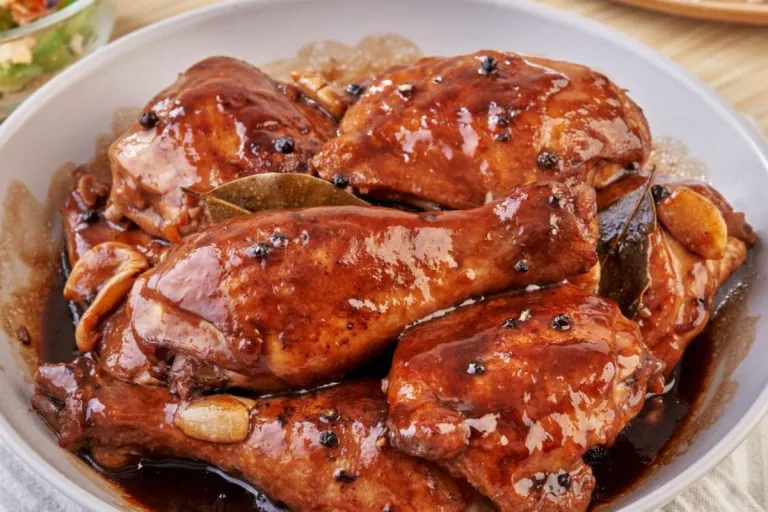 Image credit: Maggi | Official Website
Image credit: Maggi | Official Website
Adobo is often hailed as the Philippines’ national dish. Traditionally made with pork, halal versions substitute chicken or beef, simmered in a vinegar-soy sauce base with garlic, bay leaves, and peppercorns. Variations include adobo sa gata, which incorporates coconut milk for a creamier texture and southern flair.
In Manila, Shawarma Snack Center offers halal chicken adobo as part of its Filipino-Middle Eastern fusion menu. In Davao, Majid’s Kebab features a range of Filipino classics made halal. For a unique twist, look out for creamy coconut versions in southern regions like Zamboanga and Cotabato.
4. Tiyula Itum (Blackened beef soup, a Tausug delicacy)
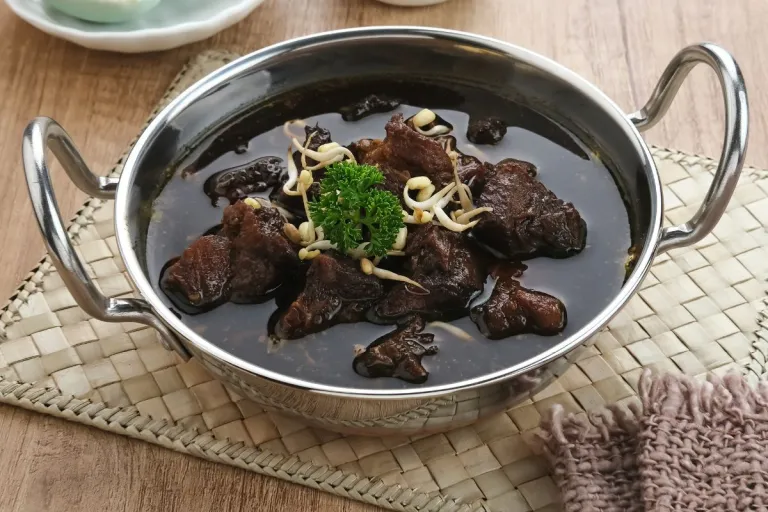 Image credit: Tyas Indayanti | Canva Pro
Image credit: Tyas Indayanti | Canva Pro
Tiyula Itum is a bold and aromatic beef soup rooted in the culinary traditions of the Tausug people of Sulu. Its dark colour comes from toasted coconut, ground into a rich paste and blended into the broth. The soup is infused with spices like turmeric, lemongrass, and ginger, giving it a smoky, slightly spicy kick that's both warming and deeply flavourful.
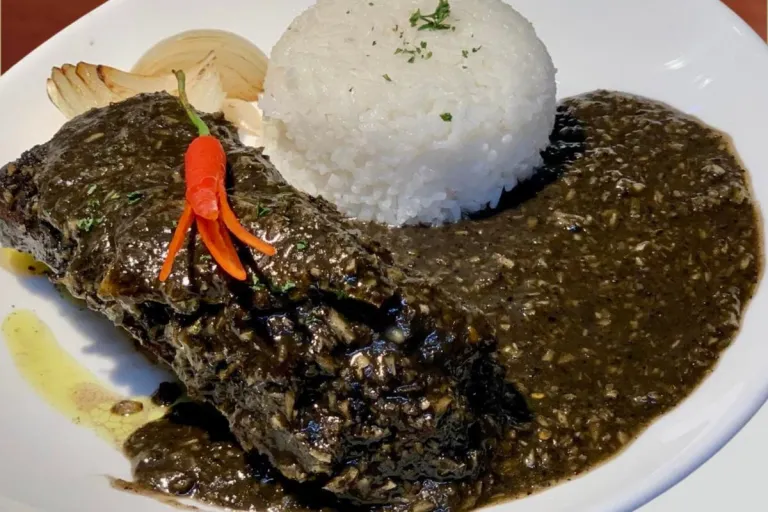 Image credit: Meister's Uncorked | Official Facebook
Image credit: Meister's Uncorked | Official Facebook
You can savour this dish at Bay Tal Mal and Dennis Coffee Garden in Zamboanga City. These Muslim-owned establishments serve a variety of Tausug and Mindanaoan dishes, making them excellent choices for halal dining. Tiyula Itum is best enjoyed with puso—rice cooked in woven coconut leaves.
5. Ginataang Manok (Chicken in coconut milk)
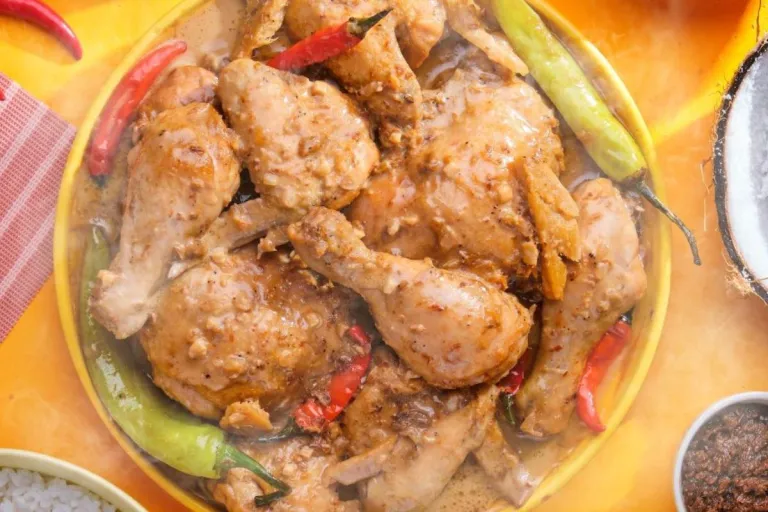 Image credit: Maggi Philippines | Official Website
Image credit: Maggi Philippines | Official Website
This comforting stew is a staple in many Filipino households. It’s made with chicken simmered in coconut milk, ginger, garlic, and optional chilli, resulting in a dish that's mild yet flavourful—perfect after a long day of sightseeing. Some variations also include leafy greens like malunggay or pechay.
Halal-friendly versions of ginataang manok can be found in both Cebu and Davao. In Cebu, try the Halal Eatery at Cebu Islamic Center, while in Davao, Al Sultan Restaurant serves this creamy chicken dish with Muslim travellers in mind. Be sure to confirm that shrimp paste (bagoong) isn’t used, as some regional recipes may include it.
6. Satti (Grilled skewers with fiery sauce)
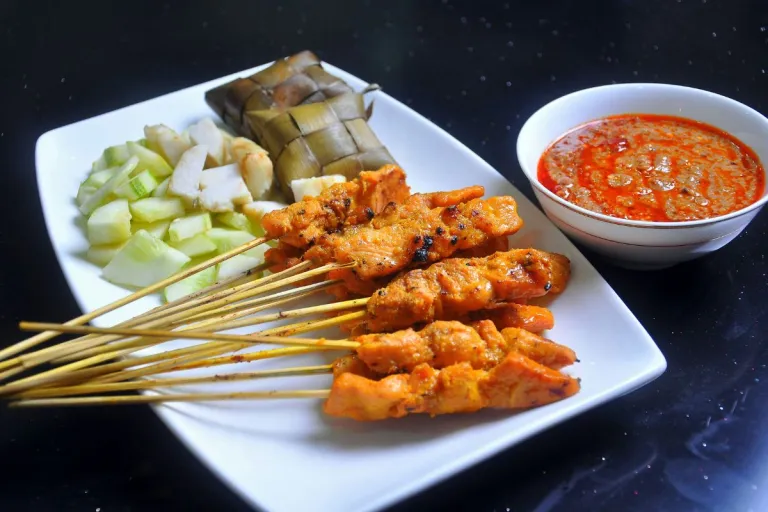 Image credit: Richdelia | Canva Pro
Image credit: Richdelia | Canva Pro
Satti is Zamboanga’s answer to satay—grilled beef or chicken skewers served with sweet and spicy sauce, typically accompanied by rice cubes. It’s especially popular as a breakfast dish, with its rich sauce and smoky meat offering a hearty start to the day.
Authentic halal satti can be enjoyed at Jimmy’s Satti Haus or Satti de Zamboanga, both located in Zamboanga City. These spots are well-loved by locals and are known for their early-morning servings of this fiery Tausug favourite. Visitors from Malaysia and Singapore will find it comfortingly familiar, with a Filipino twist.
7. Pastil (Steamed rice with shredded beef or chicken)
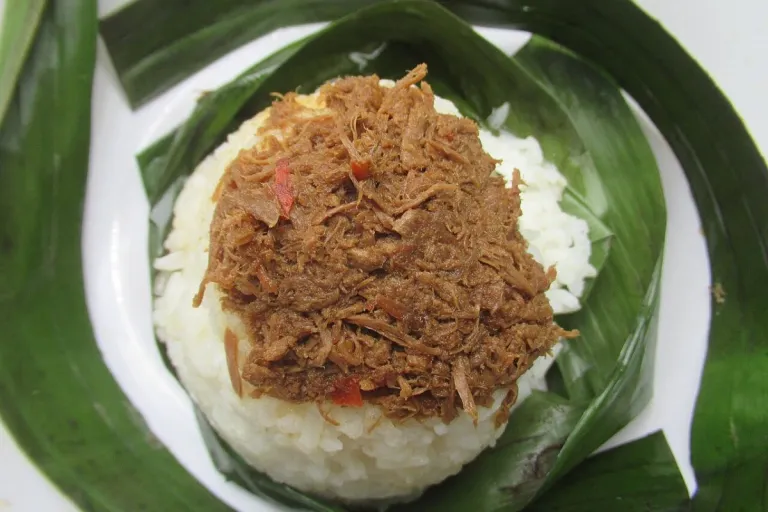 Image credit: Wikimedia Commons
Image credit: Wikimedia Commons
Pastil is a Maguindanaon street food staple—steamed rice topped with kagikit (shredded meat), wrapped in banana leaves. It’s tasty, portable, and very affordable. The meat is usually cooked in soy sauce, garlic, and spices, creating a savoury, slightly sweet topping.
There are great places to start. In Davao, Pastil Queen is a must-visit for halal pastil. In Cotabato, explore the Muslim Town Market, where local families prepare fresh versions daily. With prices as low as ₱50 (S$1.20), it’s a delicious and budget-friendly halal meal, perfect for Muslim backpackers and students.
8. Pianggang (Blackened coconut chicken, a Maranao speciality)
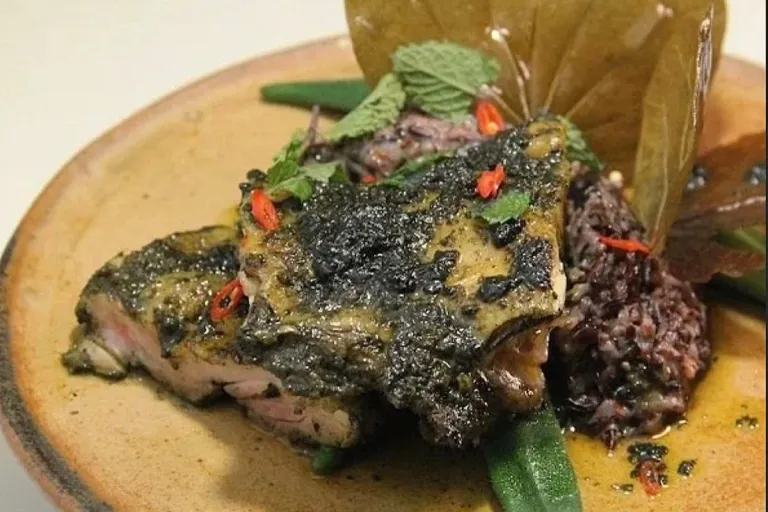 Image credit: Filipino Food Month | Official Facebook
Image credit: Filipino Food Month | Official Facebook
Pianggang is a Maranao chicken dish made with charred coconut, turmeric, garlic, ginger, and other spices. It’s blackened in colour and rich in flavour, with a smoky-sweet undertone. This traditional dish is often reserved for special occasions in Maranao households.
Try pianggang at Pakigdait Restaurant in Iligan City, which showcases Muslim Mindanaoan fare. In Marawi, travellers can arrange home-cooked Maranao meals through local community hosts or halal food tours. It’s a unique culinary experience that brings you closer to the cultural heart of Mindanao.
9. Halal-friendly Lumpia (Fresh or fried spring rolls)
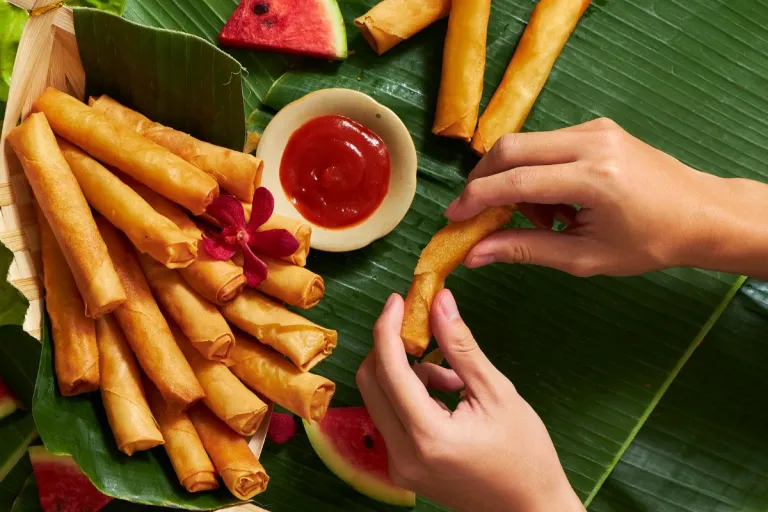 Image credit: Thao Nhu | Canva Pro
Image credit: Thao Nhu | Canva Pro
Lumpia is a beloved Filipino snack, traditionally stuffed with ground pork and vegetables. For halal-friendly versions, pork is replaced with chicken, beef, or a mix of vegetables. Lumpia can be either fresh (lumpiang sariwa) or fried, and is often served with sweet garlic sauce or spiced vinegar for dipping.
Muslim-friendly options are available at Rekado Filipino Comfort Cuisine in Davao—just be sure to confirm the ingredients with the staff. In Manila, The Halal Guys PH at Bonifacio Global City offers halal-certified spring rolls alongside their popular Middle Eastern staples.
10. Dinulutan a Seda (Spicy grilled tuna jaw)
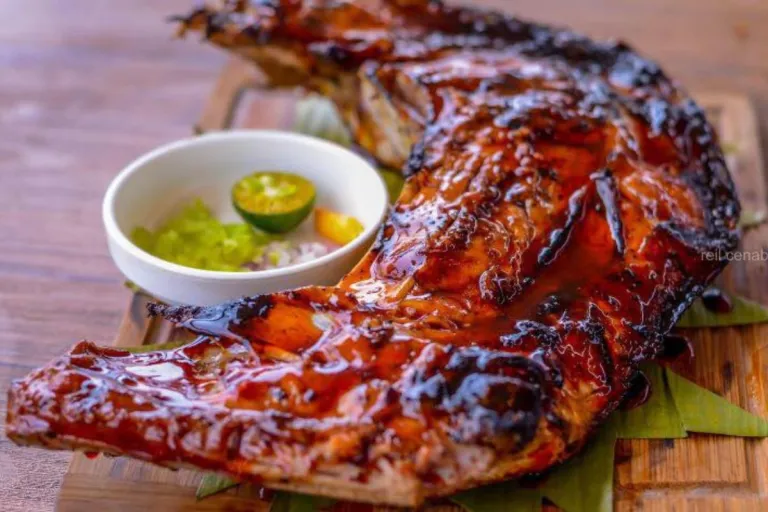 Image credit: KKD STK + BBQ | Official Facebook
Image credit: KKD STK + BBQ | Official Facebook
A staple in coastal Muslim communities, especially in General Santos and Davao, this dish features grilled tuna jaw (seda) marinated with turmeric, garlic, and spices. It's smoky, spicy, and full of umami, perfect for seafood lovers.
You can enjoy halal versions of this dish at Tambilawan Kamayan Restaurant in General Santos or Muslim-friendly eateries in Davao’s Roxas Night Market that offer seafood stalls clearly marked as "No Pork" or "Halal".
11. Sayongsong (Muslim Filipino rice cake dessert)
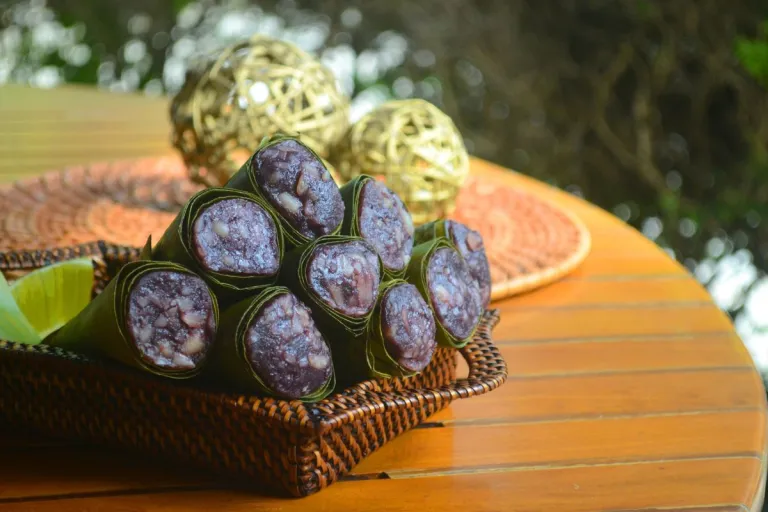 Image credit: bluewater.maribago | Instagram
Image credit: bluewater.maribago | Instagram
Sayongsong is a steamed sticky rice cake made with glutinous rice, coconut milk, and sugar, wrapped in banana leaves. It's commonly served during special occasions in Mindanao, particularly in Surigao and Davao del Norte.
Muslim-friendly versions can be found in halal snack shops or public markets near mosques in Tagum or Davao City. Look out for vendors near the Davao Islamic Center or Muslim Town Market in Cotabato.
12. Tinagtag (Sweet fried rice crisps)
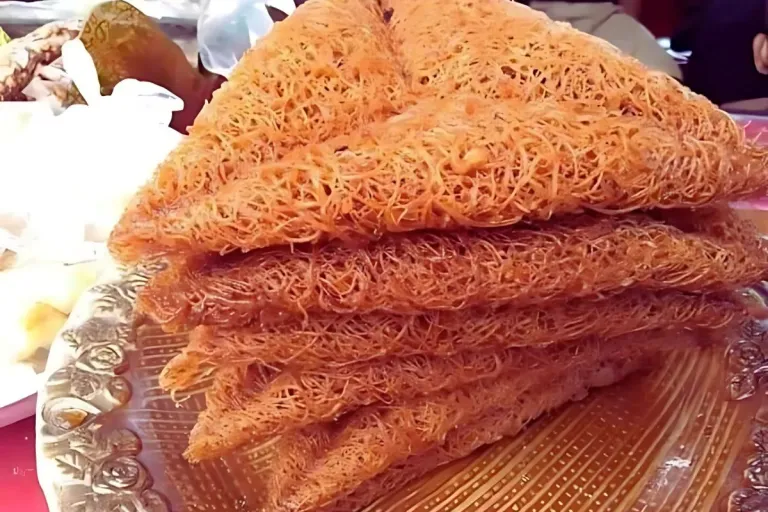 Image credit: Bangsamoro Commission for the Preservation of Cultural Heritage | Official Facebook
Image credit: Bangsamoro Commission for the Preservation of Cultural Heritage | Official Facebook
Popular among the Maguindanaon people, tinagtag is a crispy, flower-shaped rice snack made from rice flour, sugar, and coconut milk. It's a beloved street snack and pasalubong item.
You can find halal tinagtag in Cotabato's Barter Trade Center or from local Muslim vendors in Marawi and nearby Lanao del Sur towns. These snacks are great for gifting or enjoying on the go.
13. Durian candies & halal snacks (Souvenir alert!)
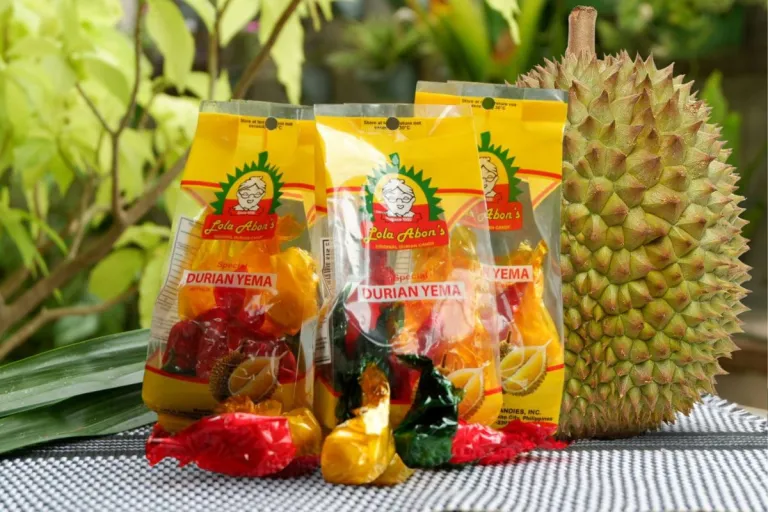 Image credit: Lola Abon's Durian Candies, Inc. | Official Facebook
Image credit: Lola Abon's Durian Candies, Inc. | Official Facebook
Durian is a regional fruit known for its strong smell and rich taste, particularly popular in Davao. Filipino durian candies are often made into bars, toffees, and jams. Other halal-friendly snacks include banana chips, mangosteen candy, and local dark chocolate.
For chocolate lovers, the Malagos Chocolate Museum offers halal dark chocolate made from locally grown cacao beans—perfect for gifting or snacking on the go.
Also read: 10 Best Halal-Friendly Destinations in the Philippines for Muslim Travellers
Final tips for Muslim foodies in the Philippines
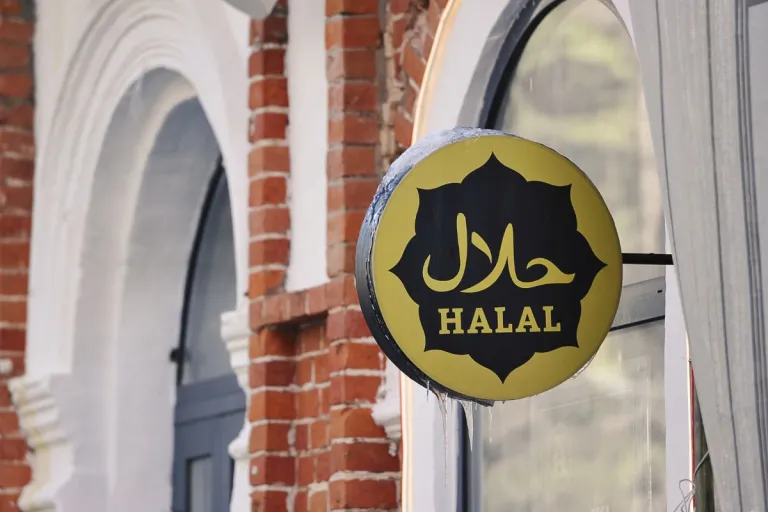 Image credit: fordeno | Canva Pro
Image credit: fordeno | Canva Pro
It is always helpful to ask the locals when navigating the halal food scene in the Philippines.Phrases like "Halal po ito?" (Is this halal?) or "Walang baboy?" (No pork?) are easy to remember and widely understood. Many vendors and restaurants are familiar with these questions and are more than willing to accommodate Muslim travellers.
Another tip is to look for mosque-friendly eateries, especially in cities with significant Muslim communities, such as Zamboanga and Cotabato. Many halal restaurants are conveniently located near mosques, providing a convenient place to dine before or after prayer.
For a deeper and more immersive experience, consider joining Muslim-led food tours in cities like Manila, Davao, or Zamboanga. These tours not only highlight local halal eateries and dishes but also offer cultural insights and stories behind the food and the region’s culinary traditions.
Finally, use helpful apps like HalalTrip or Zabihah. These platforms can guide you to certified halal restaurants nearby and provide user ratings and reviews, helping you explore the best halal food spots in the Philippines with confidence.
Embark on a flavourful journey through the Philippines—one Halal bite at a time!
Filipino cuisine is a feast of bold flavours, rich traditions, and regional specialities waiting to be discovered. From the smoky aroma of halal chicken inasal to the comforting warmth of pianggang and the spice of Tausug satti, taste your way across islands, explore hidden halal gems, and experience the Philippines through its scrumptious food!
So pack your appetite—and your camera—for a delicious adventure!
______________________________________________________________________________________________
Brought to you by the Tourism Promotions Board (TPB) Philippines
Published at
About Author
Aimi Zulkiflee
Subscribe our Newsletter
Get our weekly tips and travel news!
Recommended Articles
15 Best Halal Foods in Kowloon, Hong Kong Top Muslim-Friendly Things to Do at The Newest Antara Genting Highlands It’s located between Peacehaven Campsite and Cradle Rock Genting Highlands, along Jalan Utama Genting Highlands
10 Best Halal-Friendly Destinations in The Philippines for Muslim Travellers Not just Boracay...
10 Best Halal Restaurants in Pattaya Serving Authentic Thai Cuisine Let's try Halal Authentic Thai Cuisine in Pattaya
10 Best Places for Muslim Travellers to See Tulip Festivals in 2025 Fun Fact: Tulips didn’t actually come from the Netherlands but Türkiye!
Latest Articles
KFC France Now Serving Halal Chicken: 24 Restaurants You Need to Know in 2026 KFC France announced that 24 of its 404 restaurants will serve certified halal chicken starting 21 Jan 2026..
Primark is Officially Coming to Dubai 2026: Opening Dates, Locations And Everything We Know 3 new stores in Dubai Mall, Mall of the Emirates and City Centre Mirdif
Muslim-Friendly Hotels in Singapore: Comfortable, Strategic, and Complete Facilities for Muslim Travelers Singapore offers many Muslim-friendly facilities, making it a comfortable destination for Muslim travelers from around the world
13 Best Hotels Near Bukit Jalil National Stadium for the Ultimate Concert Experience Planning a trip to Kuala Lumpur for your favorite idol's concert? Stay Here!
5D4N Muslim-Friendly Hong Kong & Macau Itinerary: A First-Timer’s Guide Here is a tried-and-tested 5 Days 4 Nights itinerary for your first Muslim-friendly trip!

